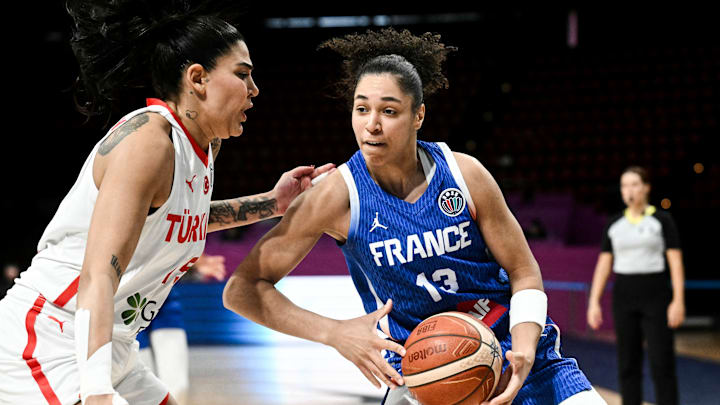It's a Thursday night in Piraeus, a port town just outside Athens, and there's thunder in the air. It's not the weather, but thousands — 8,860 to be exact, a new 21st century record — of fans packed into the Peace and Friendship stadium, ready to cheer on the host country as they take on last year's Olympic silver medalists, and fans are ready for the drama.
In a lot of ways, the game could have been played at any WNBA stadium in the United States. Sure, eight thousand is a far cry from eighteen thousand, but in the thick of beating drums, thrilled children lining up to glimpse their favorite player, and fans alternately cheering and booing in support of their team, it was impossible not to feel the kind of thrill that good women's basketball inspires everywhere.
Though football (soccer) is clearly a dominant sport across the continent, Europe has always been home to intense basketball fandoms and rivalries — but a lot of that energy and focus has been concentrated on the men's game, as the women's has lingered on the sidelines. But as we've seen so recently in the US, there are plenty of fans of women's basketball across the Atlantic; it's just up to FIBA to recognize the monumental opportunity at the federation's fingertips.
EuroBasket 2025: a brief explainer
This year's EuroBasket tournament is being hosted in Piraeus, Greece; Hamburg, Germany; Brno, Czechia; and Bologna, Italy. Piraeus will also host the elimination stage of the tournament (quarter-finals, semi-finals, and finals) when it begins on June 24; for now, four teams are playing near Athens: France, Switzerland, Turkey, and, of course, Greece.
There are several WNBA players participating in EuroBasket this year. Leonie Fiebich, Luisa Geiselsöder, and Nyara Sabally are representing Germany, Julie Allemand and Julie Vanloo are playing for Belgium, Janelle Salaün is playing for France, Jessica Shepard is representing Slovenia, Teaira McCowan is playing for Turkey, Temi Fágbénlé for Great Britain, and Cecilia Zandalasini is representing Italy.
(There are also quite a few NCAA athletes in the tournament as well, including Louisvlle's Elif Istanbulluoglu and Cal's Ioanna Krimili.)
FIBA needs to take the women's game seriously
Basketball hasn't been known as a big money-maker in Europe, though the tide has begun to shift and the continent is producing top NBA and WNBA draft picks and teams are starting to bring in cash. Or at least, the latter is true on the men's side; Greece's Panathinaikos is becoming a lucrative franchise after years of support from owner Dimitrios Giannakopoulos.
But the women's game has a long way to go before it consistently brings in the kind of money that can support the investment the game needs, and to reach that point, FIBA will need to deeply invest in the game. The women of Europe deserve more across the board: better resources, better facilities, increased opportunities to take care of their bodies and recover in the offseason. The worst thing the federation could do would be to spend the next decade or two making the same mistake the WNBA made for too long: it's not "If you build it, they will come" — it's "They're already here, you just need to show you support them."
Europeans are just as hungry for thriving women's sports teams as Americans are, and the opening days of EuroBasket have proven that in real time. The tournament still has plenty of games left, and FIBA has every opportunity to show a true commitment to supporting the players at the heart of the game. Because if the federation doesn't act quickly, the upcoming CBA negotiations in the WNBA could offer European athletes a pathway to the US, and they just might not look back.
